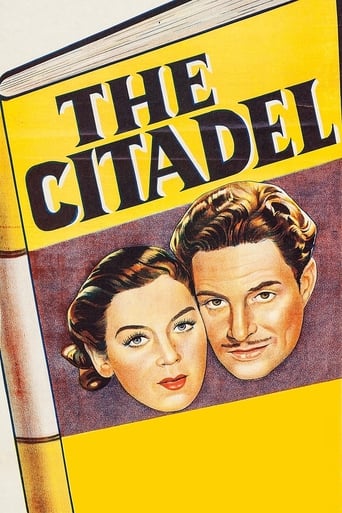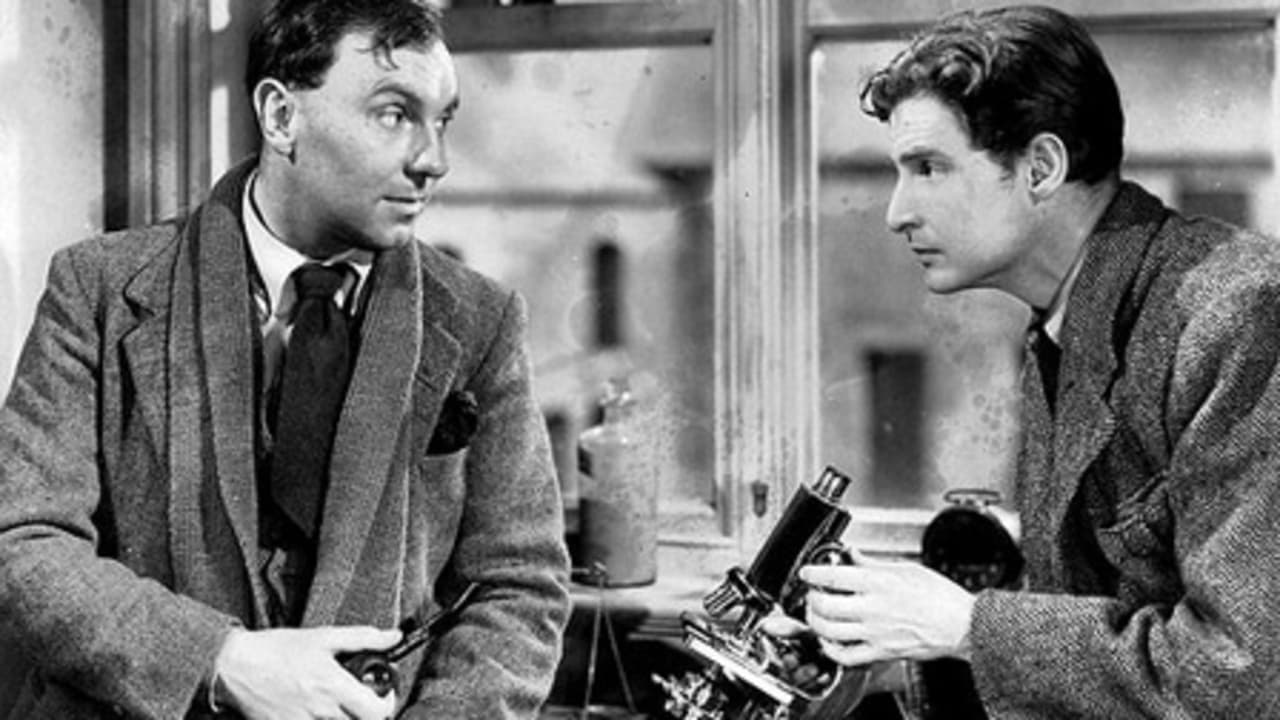George Wright
This movie shows the ease with which a young doctor can lose his ideals when he finds himself in the company of colleagues whose prime motivation is status and material reward. The role of the doctor is performed by Robert Donat, with Rosalind Russell as his wife. The Citadel is directed by King Vidor with a strong supporting cast, particularly the role performed by Ralph Richardson. It is Richardson's accident that brings Donat to his senses as he realizes he has lost the ideals that once motivated him. Movies can entertain or provide escapism but the medium can also say something important. It can give us a dose of social realism such as Bicycle Thieves (the post World War II Italian film) or as in this film, exhort us to improve the human condition.In this movie, medicine is subverted for personal gain and social status. The theme of the movie is not about medicine per se but about values. In this case, the ethics that certain professional people adopt when they make their way in the world. This theme is not new but deserves repeating, no less today than in the 1930's when the movie was made.
kdmcc-1
This is a wonderful film that deserves to be seen by a wider audience than it currently receives. The screenplay of "The Citadel" is excellent and deals with issues that have a continuing relevance today. Indeed, its theme--the importance of having a strong sense of vocation and integrity --especially among medical doctors, will probably always retain its original significance.Robert Donat plays a physician who starts out as an idealistic young man working in a poor Welsh coal mining district, but after a series of disappointments he leaves and becomes a cynical member of a London clinic for rich patients, practising the kind of assembly line medicine that is all too common today in many countries. It is likely, however, that the film had a definite influence in countries like the United Kingdom and Canada, which developed publicly-funded medical plans after World War Two.But even the best universal health care systems can still be prone to such problems as inequities in the availability or quality of treatment and incompetent or uncaring doctors, interested only in making money. Moreover, the issues of professional ethics, individual conscience and personal commitment are applicable to many other occupations, as we've recently seen in the cases of corrupt corporations, such as Enron, which have also abused people's trust.The other main virtue of this film lies in the acting of Robert Donat. Sir Laurence Olivier once stated that Robert Donat would have been a greater actor than Olivier himself was, had it not been for the chronic asthma that plagued Donat throughout his life and ultimately killed him. That terrible respiratory illness may have inspired him, in "The Citadel," to give one of the most sensitive and moving performances I have ever seen on film, during the scene in which Dr. Manson gets a baby, thought to have died, to breath again. Donat's complete mastery of what the legendary Konstantin Stanislavsky called "tempo-rhythmn" gives a palpable urgency to this scene that is unforgettable. Watch his delicate and expressive use of his hands while he works to save the infant he's holding. These are the hands of a great actor giving life to a scene, and, at the same time, the hands of a great doctor giving life to a child.This is acting of the highest order, and if you want to see what the real "Stanislavsky Method" (and not the inferior misinterpretation of it by Lee Strasberg) was all about, Donat's performance in this scene remains as magnificent a demonstration of its goal of emotional truth as I have ever witnessed in many years of watching theatre and film. The rest of his performance is equally brilliant. The changes in his face perfectly convey the degrees by which the former idealist becomes a jaded opportunist, and then. . . Well, I don't want to be a spoiler and give the whole story away! I highly recommend "The Citadel" to anyone who enjoys films that have real meaning, or who appreciates the true, and truthful, art of acting--acting that is so brilliant and free from any trace of mannerism and artifice that we forget we're watching acting at all. We're seeing life and art unfold together. Thanks to the talent of Robert Donat, form and content become one: his concern with integrity and the film's concern with it simply merge into an inseparable artistic unity. This is a cinematic experience that nobody should miss.
Ben Parker
I wasn't too sure what to think of Vidor after Our Daily Bread. Usually, filmmakers who have a message to get across, and who don't do it all that subtly, rub me the wrong way. But after seeing The Citadel i'm starting to rethink King Vidor. Indeed i thought Our Daily Bread a very fine film, certainly from the standpoint of direction. But what Bread lacked in the two lead performances (which are quite corny and camp), has been perfected in The Citadel, where we are given two marvellous performances from Robert Donat and Rosalind Russell. And i didn't have the same feeling about Vidor's message-making in Citadel that i did in Bread. It is more subtle in Citadel, and also for a better cause (altruism in the medical profession, a very noble thing, as opposed to socialism, the subject preached about in Our Daily Bread). But now i've started thinking this about Vidor:He was a passionate artist - how much do i prefer this to someone like Rossellini who didn't think much of movies, or someone like Bergman, who often (he can be optimistic) depicts human nature as an empty, valueless abcess. The fact that he expresses such strong messages, and that in fact he has something that he finds of value, is immensely reassuring. I get so used to railing against preachy filmmakers that i seem to equate non-preachiness with cynicism, and even nihilism. Well, one doesn't have to dispise everything to make a wonderful film, which is what Vidor has done here.Everything works in The Citadel. It draws you very nicely, without pomp or flashiness, but with immense skill, into its environment, and what a lovely environment it is. You so badly want nothing bad to happen to earnest, idealistic young doctor's assistant Dr Andrew Manson. I hesitate to use the word perfection, but there is a real perfection to this movie. And i was more than a little bit moved by it. I really enjoyed it, i just thought it was wonderful. Mr Vidor really was a king.
jandesimpson
"The Citadel" is one of those circular morality fables - idealistic young man sets out full of good intentions to put the world to right, but, finding his dreams dashed by prejudice and ignorance, throws in his lot with the protection of an easy but dishonest life only to realise the error of his ways through personal tragedy with consequent redemption. A;though stylistically and culturally a world apart, it is thematically a precursor of Mizoguchi's "Sansho Dayu". Made in great Britain in 1938, its MGM backing certainly shows in higher production values than most home grown films of the period - and this in spite of much reliance on back projection of the sort that even the great Carol Reed could not always effectively disguise. One of Hollywood's top directors, King Vidor, invests it with visual quality and, in a part that could have been tailored for Greer Garson, Rosalind Russell makes a surprisingly convincing female lead, supporting the hero throughout his tribulations with every ounce of Garsonian understanding he needs. But it is Robert Donat as the idealistic doctor, who first tries his professional hand in the dark Welsh colliery valley, that is the film's greatest strength. Here was an actor who brought a sense of dignity and integrity to every role he undertook from the earliest Richard Hannay to the Chinese nobleman in "The Inn of the Sixth Happiness" which he was brave enough to play when he was literally gasping for breath. His performance in "The Citadel" is not entirely free from cliché but I imagine this was something imposed by the conventions of the period. How else to explain that when he becomes mean and mercenary he suddenly sports a very short and unsympathetic moustache which, if memory serves me right, miraculously disappears for the final scene of redemption. For the rest there is a galaxy of British acting talent to be found among the supporting roles with a brief glimpse of the dignified Nora Swinburne and a few more of a youthful Francis L. Sullivan doing his obese bigot stuff with rather less brains than usual. And as if this was not all, there is "Sexy Rexy" Harrison gracing the Harley Street scene, Cecil Parker playing a particularly odious surgeon who would no doubt be struck off the Medical Register if he were around today and the great Ralph Richardson investing the role of Donat's best friend with just about the right amount of Shakespearean rhetoric that the part will support. All in all a veritable treat provided you suspend just a little bit of disbelief.



 AD
AD



